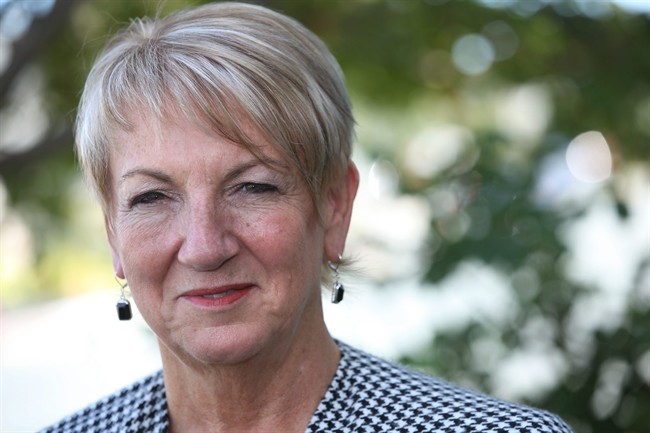ST. JOHN’S, N.L. – The offshore oil wealth that has transformed St. John’s, N.L., hasn’t made it to struggling rural outports – a point provincial rivals will hammer as Progressive Conservatives fight for a third straight majority government.

Kathy Dunderdale, the hand-picked successor to wildly popular former premier Danny Williams, will attempt to lead her Tories to victory in the province’s election set for Oct. 11.
Dunderdale met with Lt.-Gov. John Crosbie on Monday to dissolve the provincial legislature, where her party held 43 of 48 seats compared to four Liberals and one New Democrat.
She said her goal is to set out another eight-year vision for voters who first elected the Tories in 2003.
“I think that what we have to say will resonate with them again, and together we’re going to build a wonderful future for this place.”
The party’s website slogan is “We’ve never been stronger!”
This is Dunderdale’s first campaign as leader after taking over for Williams, who quit politics last December. A rift has grown between the two since then, but Dunderdale has refused to engage in any public squabble.
When asked if she would invite Williams to campaign alongside her, Dunderdale said she already has a trusted team.
“Mr. Williams is in private life now,” she said. “I have good people all around me who are anxious to get on with this campaign, and that’s where our focus is going to be.”
Dunderdale, 59, put her mark on her first budget last April with a $7.3-billion big-spending fiscal blueprint. It included cash to create child-care spaces and bolster programs and services for seniors and people with disabilities.

Get breaking National news
But critics have said the government should be doing more to pay off the net debt, which was forecast to grow by almost $460 million to about $8.7 billion.
Kevin Aylward, 51, has been the Liberal leader for just over a month after Yvonne Jones suddenly stepped down to focus on her breast cancer recovery. He comes with 18 years of political service, including nine years in provincial cabinet, that ended when he decided not to run in 2003. He could face a tough fight for a seat against Education Minister Joan Burke.
Aylward has promised to stop spending on the proposed Muskrat Falls hydroelectric dam, a $6.2-billion project in Labrador that he says would raise electricity prices for the province’s residents. He has also questioned its viability and says he would launch an independent review of the province’s future energy needs and options.
Dunderdale says the project would provide a clean and secure source of renewable energy, providing hundreds of jobs and millions of dollars in revenue for the province’s coffers as it plans to export excess energy to Nova Scotia and the northeastern United States.
Lorraine Michael, 68, was the sole New Democrat in the legislature. The slogan for her second campaign as party leader is “It’s time.”
“I don’t think I’m exaggerating when I say that we are on the verge of a historic breakthrough in this province,” she told reporters.
“I truly believe that after Oct. 11, politics in this province will have changed forever. Nobody will ever think of us again as the third party. We are the party that represents the interests of ordinary people in Newfoundland and Labrador.”
Many will be watching to see if the Jack Layton effect that saw two NDP MPs elected in Newfoundland and Labrador last May could help the provincial party break its record high of two seats.
Michael hopes to sway voters who are fed up with both the traditional Tory and Liberal machines that have traded power for the province’s history. Her party has always showcased issues such as health and home care, she said.
“What people are saying to us is they’re tired of the other two (parties) because they don’t come through,” she said. “So give us a chance. It’s time.”
Michael has also voiced concerns about Muskrat Falls, and says the riches of offshore oil have not been seen in rural outports.
Both the Liberals and NDP also accuse the Tories of not listening to communities that rely on the struggling fishing or forestry sectors – charges that Dunderdale denies. She cited efforts to help Stephenville and Grand Falls-Windsor after the shutdown of pulp and paper mills threw hundreds of people out of work.
“We would never walk away from rural parts of the province,” she said Monday. “It really is the essence of who we are as a people.”
Christopher Dunn, a political science professor at Memorial University in St. John’s, says the Conservative party’s popularity has faded under Dunderdale, although it still remains high compared to her challengers.
If the Tories and Liberals spend much of the campaign duking it out over “arcane” hydro pricing and the intricacies of the Muskrat Falls project, “they’re going to lose a lot of attention,” he said in an interview.
“I think the NDP strategy is to be like the humans in the days of Neanderthals and be smarter than the great lumbering powerful beasts that are above it, and … concentrate on issues that are of importance to families and ordinary citizens.”







Comments